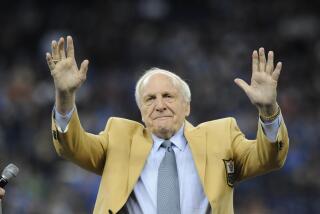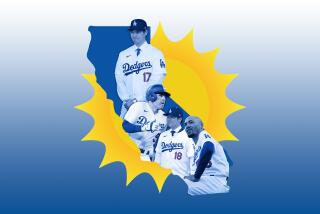Tigers Trying to Shed Detroit’s Tag of Being the City of Semifinalists
- Share via
DETROIT — If not the City of Champions, then at least call Detroit the City of Semifinalists in 1987.
Emotions in this Rust Belt city have hit more peaks than valleys this year, as a combination of fate and skill has seen the hockey Red Wings, basketball Pistons and baseball Tigers become at least semifinalists in their respective leagues.
The Red Wings fell in the National Hockey League semifinals, followed later last spring by the National Basketball Association Pistons. The Tigers captured the American League East Division title last weekend and are playing the Minnesota Twins in a bid for a second World Series appearance in four years.
Longtime observers of the Detroit sports scene say the success has been good for the much-maligned auto capital.
“It’s like a dog having fleas. It takes your mind off being a dog,” said W. Nick Kerbawy, commissioner of the Michigan Sports Hall of Fame and former general manager of the NFL Detroit Lions.
There is some disagreement about which club has generated the greatest emotional response.
“Detroit has always been a good sports town,” said John Butsicaris, co-owner of the Lindell AC, a popular bar within walking distance of Tiger Stadium and Joe Louis Arena, the Red Wings’ home. “Even during the Depression, people were interested in sports.
“Maybe it’s the Walter Mitty in all of us,” Butsicaris said. “If you’ve got a hero to look up to, it takes your mind off your personal problems.”
“It picks people up. It makes them feel there’s a possibility that if they try hard enough in their own lives, they’ll succeed,” said Kal Kaplan, a professor of psychology at Wayne State University in Detroit.
Winners are especially welcome in Detroit, where pro teams haven’t always rewarded fans with the success that can cushion the shock of a prototypical blue collar economy, observers said.
“Certain people would take it in stride more than other people,” said Kaplan. “For a person who’s down and out, it can really be a boost up.”
“You find solace in emotion,” Kerbawy said. “People jump up and down and scream. They may be in debt. They may be diseased. But if they can jump up and down and scream, God bless the team that can provide that.”
The Red Wings, Pistons and Tigers have provided plenty to scream about in 1987.
The Red Wings were coming off their worst season in the franchise’s long, Stanley-Cup studded history when first-year Coach Jacques Demers went to work.
Under his hard-nosed guidance, the Red Wings doubled their previous season point total, finished second in the Norris Division and reached the Campbell Conference finals before bowing to eventual NHL champion Edmonton.
The Pistons picked up where the Red Wings left off, falling to Boston in the NBA Eastern Conference finals in seven games. No other Pistons team ever had advanced that far in post-season play.
Both teams’ late-spring success took some attention away from the struggling Tigers. But baseball fever rekindled as the club climbed from last place in May to first place by Aug. 19, then fought off the Toronto Blue Jays to clinch the AL East title on the last day of the regular season.
Unlike the much broader playoff formats of the NHL and NBA, baseball allows only four teams to reach post-season play. And that might have made the Tigers’ accomplishment the greatest of the three, Kerbawy said.
“It’s hard to replace baseball,” he said. “We mustn’t forget the fact that the Pistons and (latter-day) Red Wings got into an area they haven’t gotten into before, and that generated greater emotion among a smaller following ... because they have been so frustrated in previous years.”
Loyalty to both the Red Wings and Tigers dates back decades, but fan response to the Pistons is a recent phenomenon, Kerbawy said.
“Before, they’d lose a couple of games and people would walk away from there,” Kerbawy said. But Pistons stars such as Isiah Thomas, Bill Laimbeer and Adrian Dantley “created an atmosphere where if they lost one night, people would still come back.”
More to Read
Go beyond the scoreboard
Get the latest on L.A.'s teams in the daily Sports Report newsletter.
You may occasionally receive promotional content from the Los Angeles Times.









